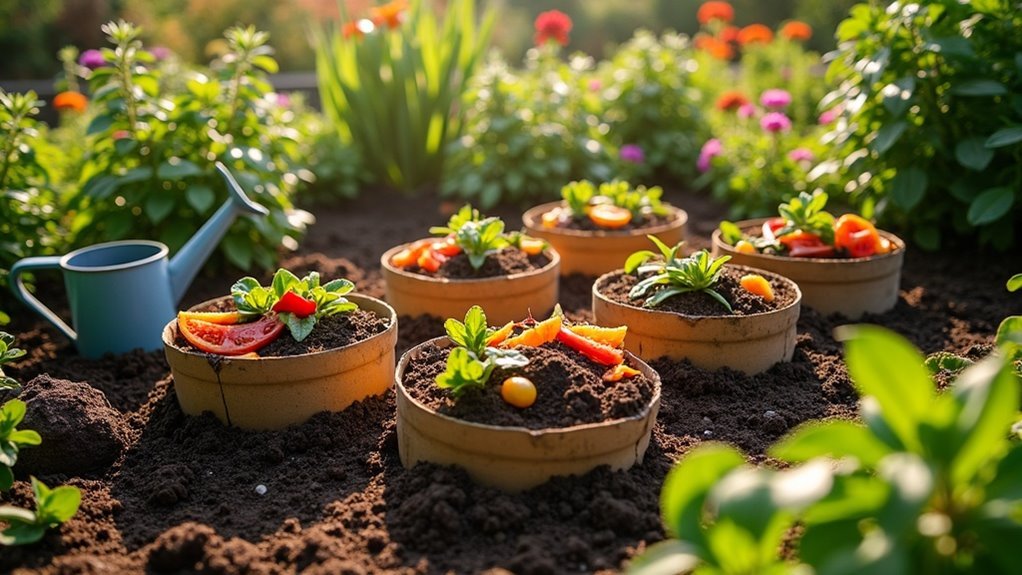Guji coffee is a unique type of Arabica coffee hailing from the Guji zone in southern Ethiopia. It’s celebrated for its complex flavors, including notes of sweet peach and chocolate, which arise from traditional farming practices and diverse processing methods. Farmers prioritize sustainability by intercropping and utilizing organic methods, which not only enhances the coffee’s quality but also helps preserve cultural heritage. As global demand for Guji coffee rises, its future depends on balancing these cherished traditions with modern market needs. Explore more about its fascinating origins and exquisite flavors ahead.
Key Takeaways
- Guji coffee originates from the Guji zone in southern Ethiopia, celebrated for its unique taste and rich cultural heritage.
- It is cultivated at high elevations in nutrient-rich volcanic soil, employing traditional and sustainable farming techniques.
- The flavor profile of Guji coffee is characterized by vibrant notes of peach, chocolate, and blueberry, which can vary depending on the processing methods used.
- Various processing techniques, such as wet-washed and natural, significantly influence the final flavor characteristics of the coffee.
- The global recognition of Guji coffee is achieved by harmonizing traditional cultivation practices with contemporary market demands and sustainability initiatives.
The Origins of Guji Coffee
While you may know that coffee has deep roots in Ethiopia, the origins of Guji coffee specifically lie in the Guji zone of southern Ethiopia, part of the Oromia region.
This area has a rich history of coffee cultivation, influenced by the Gujo tribe, who transitioned from cattle herding to coffee farming. Since 2002, Guji coffee has gained recognition as a distinct entity, separate from Yirgacheffe and Sidamo.
Guji coffee, recognized since 2002, has roots in the Gujo tribe’s transition from cattle herding to coffee farming.
Elevations ranging from 1,500 to 2,350 meters and fertile volcanic soil contribute to its exceptional quality.
Farmers utilize traditional methods to cultivate coffee, including intercropping with food crops, which promotes sustainability and enhances high-quality production.
Unique Flavor Profile of Guji Coffee
Guji coffee’s unique flavor profile is truly remarkable, characterized by its smooth, floral notes and a rich complexity that varies throughout the region.
Depending on the processing methods used, such as wet-washed or sundried, you may experience delightful flavor nuances like sweet peach or rich chocolate.
Flavor Notes Overview
When exploring the unique flavor profile of Guji coffee, you’ll discover a remarkable complexity that captivates the palate.
Guji coffee, particularly from Yirgacheffe, showcases a spectrum of flavor profiles, including sweet peach, chocolate, and blueberry. These notes vary based on traditional methods, such as wet-washed processing, which enhances bright, fruity characteristics, while sundried techniques reveal honey and spice nuances.
The region’s diverse landscapes and microclimates further enrich these flavors, ensuring a bold character unique to 100% Arabica beans.
Processing Methods Impact
Understanding how processing methods influence the flavor profile of Guji coffee is essential for appreciating its complexity.
Guji coffees undergo various processing techniques, including washed, natural, and honey-processed methods, each considerably affecting their flavor profiles.
Wet-washed coffees typically present bright, fruity characteristics, while sundried varieties reveal delicate honey and spice aromas.
The chosen processing method directly impacts acidity, sweetness, and complexity, resulting in a diverse range of tasting experiences.
Additionally, traditional methods like intercropping with food crops enhance sustainability and contribute unique flavor nuances, further emphasizing the importance of processing in defining Guji coffee’s distinct characteristics.
Regional Variations Explained
Flavor profiles within Guji coffee aren’t only shaped by processing methods but also greatly influenced by the region’s diverse landscapes and microclimates.
Guji farmers adhere to traditional practices, carefully selecting and bundling coffee from various altitudes, which range from 1,500 to 2,350 meters. This meticulous approach results in unique profiles characterized by smooth floral notes and a pleasingly complex cup experience.
The rich volcanic soil and varied climate contribute to delightful tasting notes of sweet peach, chocolate, and berry undertones.
Even within Guji, flavor can vary significantly, showcasing the intricate relationship between the environment and coffee characteristics, making each cup a distinct and enjoyable experience for coffee enthusiasts.
Traditional Farming Practices in Guji
Guji coffee farmers have successfully blended traditional practices with modern agricultural demands, emphasizing sustainability and biodiversity in their craft.
In the Guji region of southern Ethiopia, these farmers employ intercropping techniques, intertwining coffee cultivation with food crops to promote ecological balance. The area’s rich volcanic soil and high elevations create ideal conditions for indigenous landraces, flourishing in local microclimates.
By minimizing the use of synthetic fertilizers, Guji farmers embrace organic farming methods, resulting in high-quality coffee beans that boast distinct flavor profiles.
Embracing organic methods, Guji farmers produce high-quality coffee beans with remarkable and distinct flavor profiles.
This dedication to traditional practices not only preserves the cultural heritage of coffee cultivation but also enhances the global appreciation for the unique characteristics of Guji coffee.
Processing Methods for Guji Coffee
When exploring the processing methods for Guji coffee on this website, you’ll find that each technique markedly alters the final flavor profile.
The wet-washed method enhances brightness and fruity notes, while natural processing retains the cherry, resulting in complex aromas and subtler flavors.
Understanding these characteristics can deepen your appreciation for the diverse experiences offered by Guji coffee.
Wet-Washed Processing Benefits
Wet-washed processing offers significant advantages in producing Guji coffee, as it emphasizes the beans’ natural qualities.
This method involves fermenting coffee cherries to remove mucilage, resulting in a cleaner flavor profile that showcases the inherent acidity and fruitiness.
In high-altitude growing conditions, the wet-washed technique enhances complex flavor notes, including floral and fruity aromas.
This processing method not only improves clarity and brightness but also reduces defects, ensuring a consistent, high-quality product.
Guji coffees processed this way are renowned for their lively acidity and pronounced characteristics, often featuring delightful notes of citrus, berries, and tropical fruits.
Natural Processing Characteristics
Natural processing is a key method that significantly impacts the flavor characteristics of Guji coffee, allowing the beans to absorb the unique qualities of their environment.
By drying the coffee cherries in the sun before extraction, you enhance the beans’ inherent traits, resulting in a distinct flavor profile rich in fruity notes like blueberry and sweet peach, complemented by complex aromas.
Sundried Guji coffees often exhibit a bold character, featuring a syrupy body with lower acidity.
This combination makes them particularly appealing to coffee enthusiasts and baristas who appreciate their vibrant and distinctive flavors.
The Future of Guji Coffee
As Guji coffee gains global recognition, its future hinges on the region’s ability to balance traditional cultivation methods with modern market demands. The diverse Guji landscape influences the unique flavor profiles, making the coffee balanced and pleasingly complex. Local farmers are showing increased investment in cultivation, driven by rising demand for high-quality coffee.
Guji coffee’s future thrives on blending tradition with modernity, creating unique flavors that captivate global coffee enthusiasts.
Key strategies for success include:
- Strengthening long-term relationships with importers to ensure consistent market access
- Emphasizing sustainable farming practices that protect the environment and enhance coffee quality
- Adapting to global market trends to meet consumer preferences
- Maintaining traditional methods that uphold the quality and authenticity of Guji coffee
Continued collaboration among producers, processors, and buyers will guarantee that Guji coffee remains competitive while honoring its rich heritage.
The path ahead looks promising for this exceptional coffee region, poised to delight coffee lovers worldwide.
Where to Buy Guji Coffee
With the rising popularity of Guji coffee, finding quality sources for purchase is increasingly important for enthusiasts and casual drinkers alike.
You can explore various specialty coffee roasters online, where you’ll discover options for one-time purchases or flexible subscription services tailored to your preferences. Many retailers provide detailed tasting notes and roasting profiles, helping you select the ideal flavor profile and roast level.
Guji coffee is available in whole bean or ground forms, though stock may vary. Local coffee shops and roasteries also offer a chance to taste before buying, allowing you to support your community while enjoying exceptional coffee.
If you’re passionate about coffee, Guji is a must-try!








